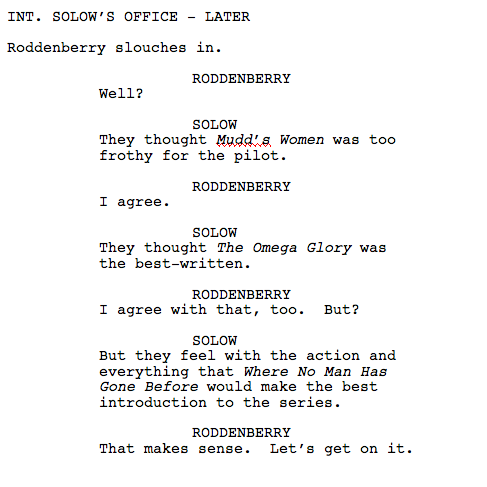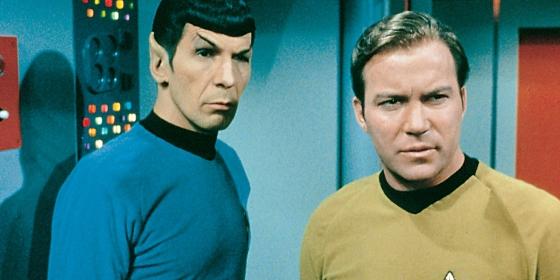Get Your Script Reviewed On Scriptshadow!: To submit your script for an Amateur Review, send in a PDF of your script, along with the title, genre, logline, and finally, something interesting about yourself and/or your script that you’d like us to post along with the script if reviewed. Use my submission address please: Carsonreeves3@gmail.com. Remember that your script will be posted. If you’re nervous about the effects of a bad review, feel free to use an alias name and/or title. It’s a good idea to resubmit every couple of weeks so your submission stays near the top.
Genre: Biopic
Premise (from writer): In 1964, writer Gene Roddenberry struggles to get his vision on television – a show called “Star Trek”.
Why You Should Read (from writer): Three reasons. One – unlike other biopics which give you the whole Wikipedia routine, my script focuses on a year-long period in a man’s life, during which he has a clear goal. Two, it could generate a discussion on the act of using licensed properties you do not own in a spec written as a sample. (Like “Wonka”, which I am certain will not be made unless Roald Dahl’s zombie corpse approaches a production office, gobstopper in hand, and signs off on it while offering casting notes: “Two words: Get Gosling.”). And, three, my script comes from the heart. My father passed on in ’91, when I was kid, and one of the things he instilled in me was a love of science fiction, particularly “Star Trek”.
Writer: Jack McAuley (based on the books, “Inside Star Trek” by Herbert F. Solow and Robert H. Justman, “Star Trek Creator” by David Alexander, and “Star Trek Memories” by William Shatner with Chris Kreski
Details: 106 pages
Man, there were some HARSH reactions to last week’s batch of amateur scripts. Let’s remember that we’re trying to be critical but supportive. The idea here is to help writers improve.
Because no single script won out in AO, I’ll be reviewing the most talked about entry, “To Boldly Go.”
I’ll start off by saying the Black List LOVES these scripts. In fact, if the Devil came to me and said, “If you don’t write a screenplay that makes the Black List this year, you’re coming down to hell with me,” the type of script I’d choose to write wouldn’t even be a contest. I’d write about a famous author’s early life and the influences it had on his greatest work. It’s like Black List crack that set-up.
And the scripts don’t even have to be that good! From the ones I’ve read, I’d say at least half are boring. It seems that the idea alone carries enough weight to overshadow the execution. It’s this secret formula that’s only talked about in basements between successful writers (“Can you believe how rich we are now? All we had to do was write about an author’s early life!”)
To Boldly Go starts off introducing us to a young Gene Roddenberry and his father, a police officer. The two are strolling through the neighborhood when the father makes a racist remark after spotting a young black boy. This is followed by a montage that covers Roddenberry’s service in World War 2 as a pilot and his eventual transition into commercial piloting.
After Gene nearly dies in two plane mishaps (one a crash), he decides to move into a job less suicidal: screenwriting (clearly, Roddenberry has never written before). He moves to Los Angeles and finagles his way onto some TV shows, until he comes up with an idea for his own show, a science fiction series where a space ship crew travels the galaxy. This was in 1964, at a time where nobody had attempted something of this scope on television.
The remainder of the story chronicles the making of the show, everything from finding a director to casting the part of Spock. When the studio doesn’t like what Roddenberry comes up with, they give him a second chance for some reason, and he recasts everyone (save Spock) and turns the show into more of an action-adventure. Although the show was cancelled after three seasons, it would later inspire five spin-off series and twelve feature films and become one of the most recognized science-fiction brands ever. It is the original “Universe” approach that every studio in town has adapted today.
One of the things I still have a hard time grasping in screenwriting is theme. Sometimes it feels so clear and other times wholly elusive. But today’s screenplay helped me understand theme about as well as I’ve ever understood it. And that’s because there wasn’t any. And that’s what kept To Boldly Go from working.
Instead of there being a unified message to keep going back to in To Boldly Go, we got a hodge-podge of events that happened to Roddenberry over the course of his lifetime – mostly in relation to Star Trek. Everything from Roddenberry’s infidelity to escaping a plane crash to looking for an associate producer. Put frankly, the message was all over the place.
I went back to the comments for Amateur Offerings, and someone brought up how interesting it was that Roddenberry’s father was a racist, and how that was an inspiration for him to create a racially diverse cast on Star Trek.
Now THAT to me is a story. THAT to me is a theme you can hang a movie on. And yet, it’s BARELY covered at all here.
Instead, we get the technical details of how the show came together (the hiring of the costume guy, the production designer, the music guy). There’s no drama in that (or at least there wasn’t any here). Even William Shatner, who it’s well known is one of the most difficult people ever in show business, is rosy and happy and agreeable in this.
If you know, going in, what your theme is – say it’s a man hellbent on changing the white-washing of television shows because his father was a racist – then it’s easy to figure out what does and doesn’t belong in your script. Take Roddenberry’s infidelity. Can infidelity lead to drama? Sure. But since it has no bearing whatsoever on a man trying to break down racial barriers in television, there’s no reason to include it.
Personally, I think that’s a great storyline to focus on – the race stuff. Because nobody knows that. Everybody knows that Spock has weird ears. With a biopic, you have to give us the stuff we don’t know and a young boy who was so affected by his father’s racism that he wanted to change the world with a multi-ethnic show – that’s a fucking movie right there. I’d go see that. What I wouldn’t go see is a highlight reel of kooky things that happened on the Star Trek set. There’s no depth to that.
This leads to my second problem with the script which was the lack of conflict. For a show that was so cutting edge and unlike anything that came before it, where was all the resistance? Where was that one executive who hated the idea and was constantly trying to kill it? There was no drama on that side of the story. It was, again, technical historical bullet points combined with occasional goofy memories (having to stop filming because pigeons were on the set).
For example, when the show’s pilot goes bad, they’re just offered another pilot on the spot. The characters don’t have to do anything, don’t have to earn anything. They simply get a call that says, “We didn’t like that. Try again.” The last thing you want to do in any script is magically solve problems for your characters. You need your characters to encounter obstacles and then to overcome them themselves, regardless of if that’s not the way it happened in real life.
This scene, in particular, embodied the casual, “no problem’s really that bad” nature of the script. It comes after the network reads the three potential scripts for the new pilot.

As you can see, even when there are problems, they’re just solved instantly. All the characters have to do is listen.
There are some dialogue issues here as well. Mainly, the characters sound too stiff, technical, or robotic. Take this line from Roddenberry when he’s told he has to reshoot the pilot: “But they want me to get rid of Spock. I am therefore going to keep him, anyway.” I don’t know anybody who talks like that who isn’t sitting on a leather chair in front of a fireplace smoking a pipe. How bout, “They want me to lose Spock. They might as well tell me to lose space.” Relax the dialogue. Have a little more fun with it. Contractions, overlapping, less formal-speak. All those things will help.
I do think there’s more leniency in the industry when it comes to these scripts. A lot of people are just keen to go down memory lane. I remember that’s exactly how that Black List Chewbacca script played out two years ago. But for me? I need more. And I think writers should demand more of themselves as well. Give us a unifying theme. Give us more conflict. More drama. Little highlights here and there are fun. But they shouldn’t be the centerpiece of your script.
I hope these notes were helpful for Jack because I do think there’s a story here somewhere and with the industry falling over itself for these kinds of scripts, I think it’s worth figuring out.
What did you guys think?
Script link: To Boldly Go
[ ] what the hell did I just read?
[x] wasn’t for me
[ ] worth the read
[ ] impressive
[ ] genius
What I learned: Unless it’s a conceit that’s built into the premise, repeating things in screenplays very rarely works. I lost a lot of interest when we went through this whole pilot only to be told that we would now participate in the exact same process for a second pilot. I suppose if the second run-through is significantly different from the first, it might work, but this one wasn’t. It felt like the same general issues (casting, figuring out the script) that we’d already dealt with. In a movie like “Edge of Tomorrow,” the repeating structure is an essential component of the premise. Here, it just feels like we’re doing the same thing over again.



